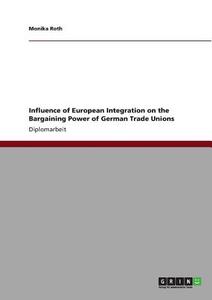
Influence of European Integration on the Bargaining Power of German Trade Unions
- Editore:
GRIN Publishing
- EAN:
9783640839025
- ISBN:
3640839021
- Pagine:
- 104
- Formato:
- Paperback
- Lingua:
- Tedesco
Descrizione Influence of European Integration on the Bargaining Power of German Trade Unions
Diplomarbeit aus dem Jahr 2010 im Fachbereich BWL - Wirtschaftspolitik, Freie Universität Berlin (Otto Suhr Institut - Politikwissenschaft), Veranstaltung: Politikwissenschaft, Sprache: Deutsch, Abstract: German trade unions' influence in industrial relations at the national level is curbed by the side effects of European integration. Supranationalization implies the transfer of regulatory power from the national to the supranational level. In the various policy areas, integration and supranationalization proceed at different speeds with regard to scope and level. This also applies to the neighboring policy areas of economic and labor policy. However, due to the overlap of these two policy areas, the asymmetrical integration of economic policy vis-a-vis labor policy leads to shifts in the German collective bargaining system, thus circumscribing the scope of German trade unions' action. More specifically, sectoral asymmetry leads to asymmetric political localization of the policy areas: Regulations in the economy are mainly taken at the EU level, whereas labor and social affairs remain national competences. Furthermore, the insertion of a supra-national layer is accompanied by a policy-theoretical change of the highest governmental and judicial authority from a hitherto (social-democratic) market-correcting consensus to a now market-making approach. This shift causes respective shifts at the national level as well. Additionally, the European Court of Justice possesses supreme judicial competence in both economic and social policy and hence is able to negate national particularities that conflict with EU law. Moreover, EU institutions are able to regulate national labor and wage policy, since there is a broad overlap between economic and wage policies. Supranational regulations in economic policy can thereby influence and constrain national wage policy. Finally, because of Economic and Monetary Union, the exchange rate mechanism is no longer applicable as a tool of economic policy, which entails high incentives for regulating labor costs by wage policy alone.



